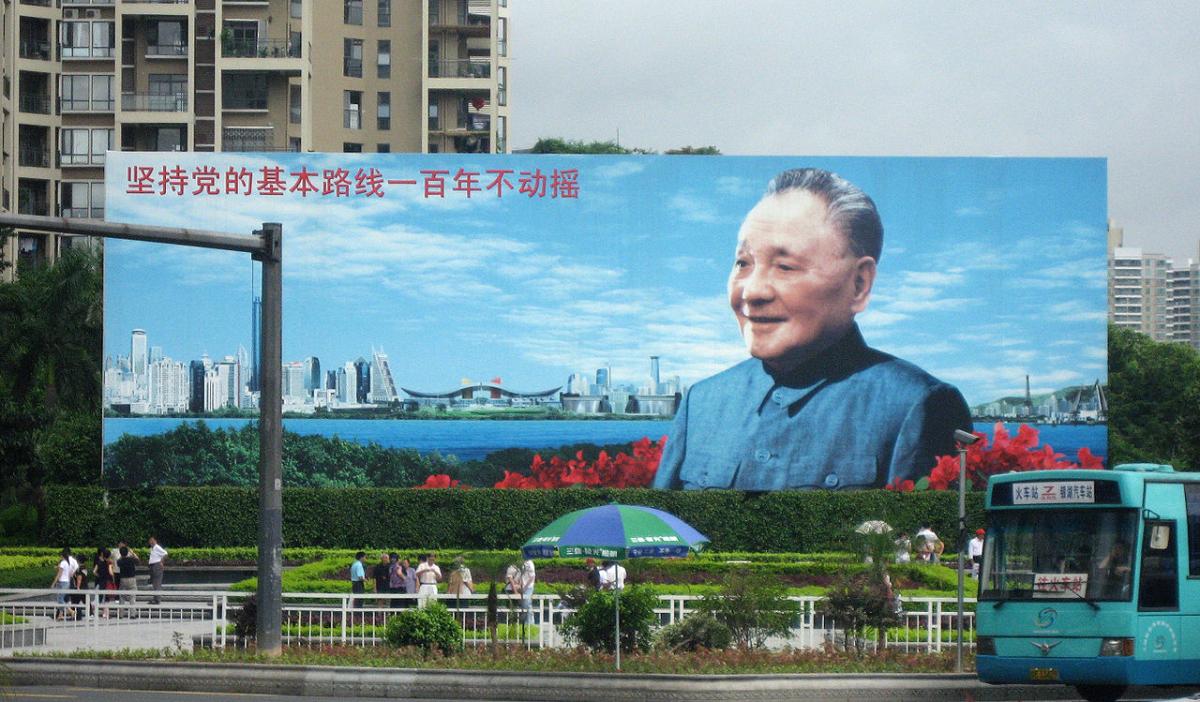Comparing historical figures enlightens even when it discomfits. No American relishes comparing a George Washington or an Abraham Lincoln to, say, a tyrant such as Adolf Hitler or Josef Stalin. Yet likenesses between foreign leaders and the greats of U.S. diplomatic and military history can be striking and informative. Ferreting out differences repays the effort as well.
Exhibit A: Deng Xiaoping. Beginning in the late 1970s, the Chinese Communist Party (CCP) premier played a part in China’s national development similar in noteworthy respects to the part Washington played in the early U.S. republic. In particular, Deng masterminded China’s “reform and opening” project, an initiative designed to rejuvenate the country’s moribund economy and clean up the wreckage from founding CCP chairman Mao Zedong’s cataclysmic reign.
Despite black marks on his record—foremost among them the 1989 massacre in Beijing’s Tiananmen Square—Deng deserves credit for launching China on the course that transformed Asia’s sick man into an industrial, trading, and—increasingly—political and military powerhouse. And, indeed, he is known with considerable justice as contemporary China’s founding father.
That is chiefly because Deng created room for a backward China to reform itself. He managed the strategic environment in China’s interest, fending off geopolitical threats while the country undertook its economic renaissance. A surge in manufacturing and trade ensued, furnishing the wealth to fund implements of great power—implements such as a world-class navy. Beijing now enjoys the option to assert itself, an option it has increasingly exercised in recent years.
In 1990, Deng Xiaoping devised a “24-character formula,” a simple doctrine to guide Chinese Communist Party diplomacy during the reform-and-opening era. It reads: “Observe calmly; secure our position; cope with affairs calmly; hide our capacities and bide our time; be good at maintaining a low profile; and never claim leadership.” In other words, Deng wanted China to abstain from power politics until it was strong enough to assert itself in Asian and world politics without undue risk. Under his stewardship, China postponed—but did not cancel—its ambitions.
Two centuries before Deng, American founder George Washington fashioned his own doctrine of foreign-policy restraint, and for similar reasons: to give the fledgling United States a chance at internal development during an age when European empires were forever meddling—or worse—in the non-European world. Washington enunciated a “great rule of conduct“ in his Farewell Address of 1796, his parting words to the U.S. people after years of war leadership and two terms as president.
Washington’s great rule was to nurture overseas commerce while maintaining “as little political connection as possible” with foreign capitals. “Europe,” he continued, “has a set of primary interests which to us have none; or a very remote relation.” Washington considered it unwise for the United States to embroil itself in “the ordinary combinations and collisions of her friendships or enmities.” Foreign politicking might set the individual states against one another or reduce the United States to a European plaything.
Happily, geography granted the United States the luxury of abjuring power politics in that era. “Our detached and distant situation,” maintained the departing President, “invites and enables us to pursue a different course. If we remain one people under an efficient government, the period is not far off . . . when we may choose peace or war, as our interest, guided by justice, shall counsel.” Secluding itself for a time would permit Americans to gather the rudiments of economic and military power, making themselves a force to be reckoned with.
Afterward—after it had harnessed its latent strength—the United States reserved the right to involve itself in regional and world politics. Washington’s great rule foreshadowed Deng’s 24-character doctrine. It was a formula whereby a future great power deliberately undertook a period of internal development until strong enough to deploy an outward-looking, muscular diplomacy.
So much for the similarities between America then and China today. There are stark differences as well—and they also illuminate. First, the velocity of China’s rise outpaced that of the United States by a large margin. Washington articulated his great rule in 1796. Only in 1883 did shipbuilders lay the keels for the U.S. Navy’s first serious battle fleet—the long arm of U.S. foreign policy in those days. And only in the 1890s, a century after Washington retired to Mount Vernon, did the United States genuinely begin to flex its muscles.
Once the United States had a cudgel, its leaders took to brandishing it. In 1895, the U.S. government demanded the right to mediate a border dispute between Great Britain and Venezuela. Secretary of State Richard Olney, in fact, proclaimed that the United States’ “fiat” was “law” in the Western Hemisphere. What America said went. That is a far cry from the first President’s great rule. Three years later, U.S. land and sea forces evicted Spain from island holdings in the Caribbean Sea and the Philippines.
The United States heeded George Washington’s foreign-policy axiom for a century, then made itself into an empire of modest scale. Communist China made its ascent at breakneck speed by contrast.
Deng instituted his 24-character doctrine in 1990. By 2009, having begun upgrading the People’s Liberation Army during the 1990s, Beijing felt strong enough to issue its “nine-dash line” map claiming the South China Sea at its neighbors’ expense. In 2010, it took to browbeating Asian neighbors in public forums. In 2012, it wrested Scarborough Shoal from the Philippines. In 2013, it began constructing artificial islets atop South China Sea reefs and atolls to host military and nonmilitary ships and aircraft.
These were not the actions of a power intent on hiding its capacity or biding its time any longer. China’s period of seclusion lasted less than two decades—from the onset of Deng’s 24-character strategy in 1990 until Beijing’s announcement of the nine-dash line in 2009. This is a country on the move.
Second, both the United States and Communist China benefited from an external supplier of maritime security while they focused inward. The erstwhile U.S. foe, Great Britain and its Royal Navy, saw an interest in keeping order in the New World during the 19th century, mostly safeguarding U.S. coasts in the process. Happenstance spared the United States the labor, cost, and opportunity costs of constructing a great navy—allowing its citizens to devote their energies and resources to internal development. The U.S. Navy likewise kept order at sea following Communist China’s founding in 1949, and on through its reform-and-opening phase.
Yet China turned against its protector while the coming-of-age United States did not. Why? Similar cultures, heritage, and worldviews must have helped smooth out relations between Britain and the United States. Communist China and the United States have no similar cultural lubricant. An external threat, moreover, summoned the Royal Navy home to European waters around 1900, when imperial Germany started building a battleship fleet in the North Sea—a fleet that could only have been aimed at the British Isles. Homeland defense came first.
Vacating American waters removed an irritant from Anglo-American relations. By contrast, the Soviet threat kept the United States in Asia after World War II. U.S. forces remained in place after the Cold War. China’s burgeoning navy, then, is bound to confront U.S. and allied fleets in Asia’s cramped maritime confines. In short, geopolitical circumstances have not afforded China and the United States the opportunity to fashion a maritime condominium. It will take conscious effort for the contenders to craft rules whereby they can coexist.
Or not. They could fight for supremacy.
And third, the tenor of Deng’s 24-character formula differs starkly from that of Washington’s Farewell Address. George Washington simply espoused an interlude of quiet to consolidate a new nation. Beyond obeisance to justice and the national interest, he proffered little counsel on goals or methods of statecraft. Deng espoused concealment and deception, entreating China to hide its power. His phrasing offers yet another reminder that deceit is graven on Communist China’s way of diplomacy and war. It will doubtless outlive Deng’s foreign-policy maxim. It is hard to devise an amicable working relationship with deceptive interlocutors.
Sorting out the rules of the game with a newly brawny competitor—one with a chip on its shoulder and a proclivity for deception—is apt to be a trying, uncertain process. Knowing U.S. history can help show the way.hol




